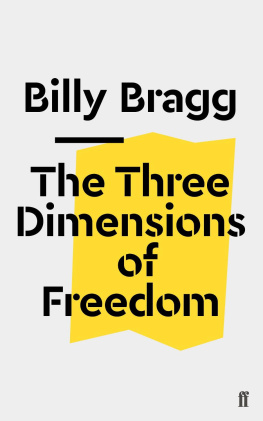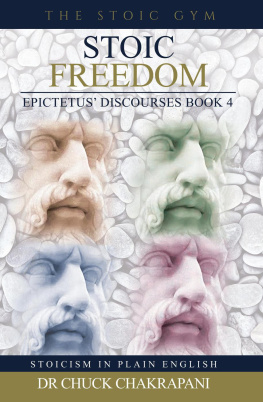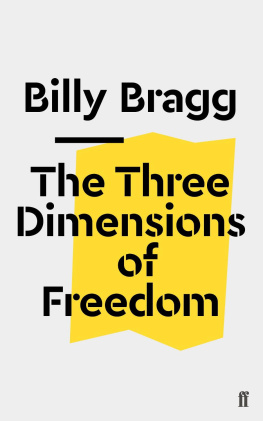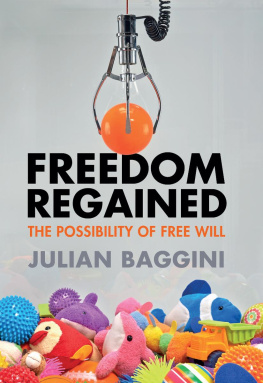THE OXFORD HANDBOOK OF
FREEDOM
THE OXFORD HANDBOOK OF
FREEDOM
Edited by
DAVID SCHMIDTZ
and
CARMEN E. PAVEL


Oxford University Press is a department of the University of Oxford. It furthers the Universitys objective of excellence in research, scholarship, and education by publishing worldwide. Oxford is a registered trade mark of Oxford University Press in the UK and certain other countries.
Published in the United States of America by Oxford University Press
198 Madison Avenue, New York, NY 10016, United States of America.
Oxford University Press 2018
All rights reserved. No part of this publication may be reproduced, stored in a retrieval system, or transmitted, in any form or by any means, without the prior permission in writing of Oxford University Press, or as expressly permitted by law, by license, or under terms agreed with the appropriate reproduction rights organization. Inquiries concerning reproduction outside the scope of the above should be sent to the Rights Department, Oxford University Press, at the address above.
You must not circulate this work in any other form and you must impose this same condition on any acquirer.
CIP data is on file at the Library of Congress
ISBN 9780199989423
eISBN 9780190875572
CONTENTS
DAVID SCHMIDTZ AND CARMEN E. PAVEL
DANIEL C. RUSSELL
PIPER L. BRINGHURST AND GERALD GAUS
RALF M. BADER
HILLEL STEINER
ELIZABETH ANDERSON
FRANK LOVETT
DAVID SOBEL
FRED D. MILLER, JR.
DAVID KEYT
EDWARD FESER
ORLANDO PATTERSON
RYAN PATRICK HANLEY
JAMES R. OTTESON
MARK BRYANT BUDOLFSON
STEVEN WALL
MARK PENNINGTON
CARMEN E. PAVEL
JASON BRENNAN
MICHAEL HUEMER
RICHARD J. ARNESON
KYLA EBELS-DUGGAN
DAVID BOONIN
MATT ZWOLINSKI
SERENA OLSARETTI
VIRGIL HENRY STORR
ELIJAH MILLGRAM
EDDY NAHMIAS
ALLEN BUCHANAN
Elizabeth Anderson is Arthur F. Thurnau Professor and John Dewey Distinguished University Professor of Philosophy and Women's Studies at the University of Michigan, Ann Arbor.
Richard J. Arneson is Distinguished Professor of Philosophy at the University of California, San Diego.
Ralf M. Bader is a Fellow of Merton College and an Associate Professor in the Department of Philosophy at the University of Oxford.
David Boonin is Professor of Philosophy and Director of the Center for Values and Social Policy at the University of Colorado, Boulder.
Jason Brennan is the Robert J and Elizabeth Flanagan Family Chair of Strategy, Economics, Ethics, and Public Policy at the McDonough School of Business, Georgetown University.
Piper L. Bringhurst is a PhD Student in Philosophy at the University of Arizona.
Allen Buchanan is James B. Duke Professor of Philosophy and Professor of Law at Duke University.
Mark Bryant Budolfson is Assistant Professor of Philosophy at the University of Vermont.
Kyla Ebels-Duggan is Associate Professor of Philosophy at Northwestern University.
Edward Feser is Associate Professor of Philosophy at Pasadena City College.
Gerald Gaus is the James E. Rogers Professor of Philosophy at the University of Arizona, and Director of the program in Philosophy, Politics, Economics, and Law.
Ryan Patrick Hanley is Mellon Distinguished Professor of Political Science at Marquette University.
Michael Huemer is a Professor of Philosophy at the University of Colorado, Boulder.
David Keyt is Emeritus Professor of Philosophy at the University of Washington and Research Professor at the University of Arizona.
Frank Lovett is Associate Professor of Political Science, and Director of Legal Studies at Washington University in St. Louis.
Fred D. Miller Jr. is Emeritus Professor of Philosophy and Executive Director of the Social Philosophy and Policy Center at Bowling Green State University.
Elijah Millgram is E. E. Ericksen Professor of Philosophy at the University of Utah.
Eddy Nahmias is Professor of Philosophy and Associate Faculty at the Neuroscience Institute at Georgia State University.
Serena Olsaretti is ICREA Research Professor in the Law Department at the Universitat Pompeu Fabra, Barcelona, Spain.
James R. Otteson is Thomas W. Smith Presidential Chair in Business Ethics and Professor of Economics at Wake Forest University.
Orlando Patterson is John Cowles Chair in Sociology at Harvard University.
Carmen E. Pavel is Lecturer in International Politics, Kings College, London, author of Divided Sovereignty: International Institutions and the Limits of State Authority (Oxford University Press, 2015), and Associate Editor of Social Philosophy & Policy.
Mark Pennington is Professor of Political Economy and Public Policy at Kings College London, UK.
Daniel C. Russell is Professor of Philosophy at the University of Arizona.
David Schmidtz is Kendrick Professor of Philosophy, Eller Chair of Service-Dominant Logic, editor-in-chief of Social Philosophy & Policy, and founding Head of the Department of Political Economy and Moral Science at the University of Arizona.
David Sobel is Irwin and Marjorie Guttag Professor of Ethics and Political Philosophy at Syracuse University.
Hillel Steiner is Emeritus Professor of Political Philosophy at the University of Manchester, UK, and Fellow of the British Academy.
Virgil Henry Storr Research Associate Professor of Economics and Director of Graduate Student Programs in the Mercatus Center at George Mason University.
Steven Wall is Professor of Philosophy at the University of Arizona.
Matt Zwolinski is Professor of Philosophy and Director of the Center for Ethics, Economics, and Public Policy at the University of San Diego.
DAVID SCHMIDTZ AND CARMEN E. PAVEL
NEARLY everyone would say freedom is a good thing, but not everyone who says that would mean the same thing, partly because terms like freedom or liberty have so many time-honored uses.
We talk of being at liberty to speak our minds, go to college, and open a bank account. Are these the same? We speak of being cancer-free, debt-free, and worry-free. We speak of being free from doubt, free from pressure, and free from prison. Different threats lead us to focus on different meanings. This volume reflects on freedoms various dimensions: legal, cultural, religious, economic, political, and psychological.
We cover current theoretical developments and key historical trends, but not with any particular checklist in mind. Rather, we found interesting authors and turned them loose to do what it was in their veins to do. Fred Miller and David Keyt proposed to write on freedom in the ancient world. Orlando Patterson wanted to reflect on freedom from the remarkable and relatively unknown perspective of renaissance Florence. Elizabeth Anderson wanted to recast the tension between freedom and equality. Eddy Nahmias wanted to discuss free will as a psychological accomplishment.
In many ways, the volume represents the culmination of long histories of asking questions about the nature of freedom. The questions themselves are not free floating, but come out of lived experiences in which individual and groups have been denied freedom in its many forms. Answering questions about freedom appropriately is not merely an academic exercise, but a way of ensuring peoples lives go better.









